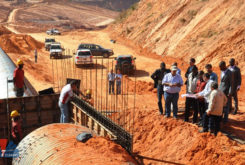On 23 September, a high-speed train will for the first time connect Hong Kong with Guangzhou, capital of Guangdong province, and China’s national high-speed network. The journey time will be 48 minutes, compared to nearly two hours for the current service.
It is a controversial project. One aspect is the price – the cost is HK$84.4 billion, making it the most expensive infrastructure project in the city’s history, after the bridge to Macao and Zhuhai. Many question its profitability. The current service takes passengers to Guangzhou East station, in the centre of the city; the high-speed train arrives at Guangzhou South in Panyu, a suburb. From there, travellers will have to take a subway, bus or taxi to reach destinations in the centre. So how much time will be saved?
The third aspect is the presence of mainland immigration and customs officers in the West Kowloon terminus in Hong Kong. The city’s Bar Association says that this contravenes the Basic Law, which states that only officials of the Hong Kong government can enforce laws in the territory of the SAR.
But the government says their presence is legal. It expects at least 80,000 passengers a day to take the new service and says that it will bring many benefits to the city, economic and otherwise.
History
The idea of an express railway to connect Hong Kong with Shenzhen and Guangzhou was first proposed in the late 1990s by the Hong Kong government.
In the 2000s, China built a national network of high-speed trains; and the proposed link to Hong Kong was changed from an express to a high-speed one.
The first part of the line, from Guangzhou South to Shenzhen North stations, opened in December 2011. In December 2015, this was extended to the city centre of Shenzhen at Futian. The length of this route is 116 kilometres, with a design speed of 350 kilometres an hour.
In early 2009, the SAR government signed a memorandum of understanding with the Chinese Ministry of Railways to build the Shenzhen-Hong Kong section of the line. It is no simple engineering task; the entire route of 26 kilometres is underground and involves rescue sidings, as well as ventilation facilities and an emergency access point.
Construction began in late January 2010. In March 2014, severe storms flooded the tunnels and caused extensive damage to the tunnel boring machines. This caused a three-month delay to construction.
Benefits of the line
In a paper, the Hong Kong SAR government set out the benefits of the new line. “The fastest travelling time to Guangzhou will be about 48 minutes, Changsha about three hours, Xiamen about four hours, Shanghai around eight hours and Beijing around nine hours. Train services are more frequent, more punctual and less susceptible to delays caused by bad weather (than air journeys).
“In mainland China, in 2016, the national high-speed rail network surpassed 20,000 km in length and carried more than 1.44 billion passengers. The target is to increase the total network length to 30,000 km and cover more than 80 per cent of major cities by 2020.
“Enhancing Hong Kong’s connectivity with the Mainland will boost exchanges between Hong Kong and major Mainland cities and foster the development of complementary advantages. The pillar industries of Hong Kong, such as financial services, trading and professional services, stand to benefit in particular … As more people from Hong Kong work, run businesses, study or retire on the Mainland, the new railway will bring even greater convenience to residents.”
But many in the city say that the majority of journeys made by Hong Kong people to the mainland are to Guangzhou and Shenzhen, where the time gain is limited. Those who benefit will be the rich and the business and the leisure classes of Hong Kong and the mainland, who will make longer journeys from Shanghai, Changsha and elsewhere, they say.
David Webb, a Hong Kong-based shareholder activist, said that the line would never be profitable for Hong Kong taxpayers. “From the government’s perspective, it is certainly not an economic rate of return. It is being done for national policy reasons, not economic reasons,” he said.
Legal or not?
The most controversial part of the new West Kowloon station, from where the trains will leave, will be the presence of mainland officials in the “the Mainland Port Area” on the third floor. Passengers entering the train will go through this area for immigration and customs purposes. In this area, everyone must abide by mainland laws.
The Bar Association and Democrats in Hong Kong have said the presence of these officials breaches various articles of the Basic Law – including Article 18 – the Bill of Rights, and the Sino-British Joint Declaration. Under Article 18, mainland laws cannot be implemented in Hong Kong, except for six national laws listed in Annex III, such as the Nationality Law of the People’s Republic of China.
They fear that, in the designated area, Hong Kong people could break mainland laws for carrying out protests – such as by asking for vindication of the 1989 Tiananmen massacre victims – which are legal in Hong Kong but illegal in the mainland. The mainland officials could arrest them; could they then be taken to the mainland for detention and trial?
For its part, the SAR government insists that the co-location arrangement was consistent with the Basic Law; “mainland personnel can only perform their duties within the ‘mainland port area’ and have no law enforcement authority in other parts of the HK SAR,” it said. It argues that such a mechanism is essential for convenience of travellers and reduce the journey time.
At the Legislative Council in May this year, the scrutiny of the bill for the colocation was completed, amid protests by pro-democracy lawmakers. They were only given one minute each to speak, and officials did not have to respond to questions one by one. The democrats chanted that the bill was unconstitutional.
They also fear that the arrangement will set a precedent; in the future, mainland officials will be allowed to operate legally in other parts of the SAR.



